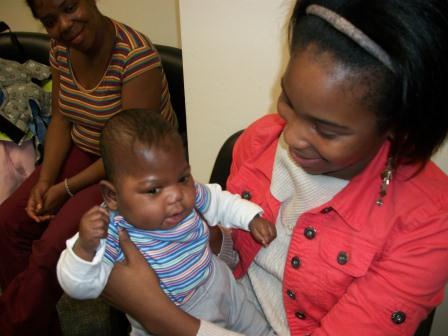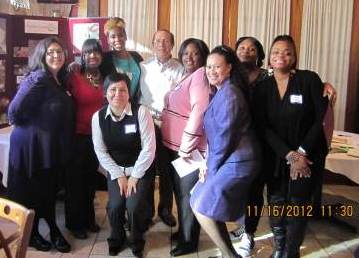 Baby Amor was born on February 6, 2012, weighing 1.92 pounds. He had surgery – with many complications – and was held in the Neonatal Intensive Care Unit (NICU) at Cook County Stroger Jr. Hospital for seven months.
Baby Amor was born on February 6, 2012, weighing 1.92 pounds. He had surgery – with many complications – and was held in the Neonatal Intensive Care Unit (NICU) at Cook County Stroger Jr. Hospital for seven months.
In March 2012, with generous support from the VNA Foundation, HealthConnect One and Cook County Stroger Jr. Hospital launched a regular gathering at the hospital for families with infants in the Neonatal Intensive Care Unit (NICU). Named by participants and facilitated by HealthConnect One Project Coordinator Helen Dimas, the “NICU Club” continues – one year later – to provide stability, peer support, and a twice-monthly forum for sharing struggles and strength.
This is a story about Amor, the "NICU Club” support and growing strong.
Amor’s mother, Quenesha, is a single mom. Amor's father William is also involved in his life. Both parents attended NICU Club.
Quenesha had been providing breast milk for five months when she first came to NICU Club, but had stopped pumping due to feeding complications. Amor was tube-feeding, and Quenesha worked in a fast food restaurant. There was no place to pump and no place to store her milk. She was told Amor needed to gain weight, so they started giving him formula. During NICU Club, Quenesha learned to hand express. She learned (again) the value of mother’s milk, and confessed to the group that she had stopped pumping. She went home and found she still had milk! She collected what she had expressed, brought her milk to the hospital NICU for Amor, and continued pumping for two more months. Full of hope.
In mid-August, Quenesha was visited by a chaplain who recommended she sign a DNR (Do Not Resuscitate).
As she understood it, Amor was not doing well; part of his brain was partially dead and they told her he would never have any kind of normal life. He was being nourished at the time through a feeding tube and this was not expected to change. Ever. “How can you come in here telling me what’s going to happen to my baby?? Nobody but God can tell me!” Quenesha was furious.
She shared this conversation during NICU Club a few days later, and the other parents rallied around her in support. It was amazing to see them come together. As the facilitator, Ms. Helen stepped back that day and let the group take charge. They shared many stories about insensitivity they’d experienced. There were tears and prayer and high intensity emotion and through it all: Faith, connection and support.
When the day came for Amor to go home, everyone in the NICU Club kept him in prayer – lifting him up in their churches, even praying for him on Christian radio stations. The group got “all spiritual” that week, Ms. Helen reports. Every group is different. Every support group, every group of breastfeeding peer counselors or new parents. In this group, any time something comes up with the babies, the moms asked for prayer.
The first week Amor was home – at 7 months, 1 week old – he experienced more complications. Quenesha came to NICU Club without him and said she was having a really hard time. He kept throwing up everything she gave him to eat. She shared with the group that she had received only three days’ worth of pre-term formula from the discharge doctor, and he wasn’t holding down the powder formula she got through WIC. She asked for more pre-term formula samples to feed her son, but the hospital wouldn’t give them to her. She was crying. Ms. Helen told her she needed to bring Amor back to Emergency so he could get nourishment. She brought him back, and he was re-admitted to the hospital.
He stayed in the hospital for five days, eating well with pre-term formula.
When he came home again, he was still feeding through a GI Tube – but every time Quenesha fed him, while she was holding him, he would try to move towards her breast. Ms. Helen observed, after all this time, “He’s doing what he’s supposed to do. Why don’t you let him?”
Ms. Helen recommended mom and baby take a warm bath together, to get them used to being skin-to-skin. It was new. They had been separated since birth. Often at this point, it feels uncomfortable. Quenesha took Ms. Helen’s advice and Amor latched! He would latch up to three minutes at a time, and so began oral feeding – first at the breast, later with a bottle, and Quenesha got a pump to help her milk supply. Amor is now getting breast milk regularly, and topping off with formula. No more tube!
Amor is home and alert now, watches everything and hates to lie down. (Wouldn’t you, after lying on your back for 7 months?!) He pulls up when someone holds him, wanting to sit up all the time. “He doesn’t like to lay down, be held like that, like a baby – I have to sit him up like a big boy,” says Quenesha. “They told me to prepare for him to die, but I knew he was going to live.”
He has a distinct personality and it is easy to see how much he loves his mama. He watches her when someone else is holding him, and he prefers to be in her arms rather than someone else’s.
 Recently, Quenesha participated in HealthConnect One’s first Breastfeeding Peer Counselor training specifically for moms who’ve had babies in the NICU. As historian for their November 2012 graduation, she described the evolution of her class – for all those in attendance.
Recently, Quenesha participated in HealthConnect One’s first Breastfeeding Peer Counselor training specifically for moms who’ve had babies in the NICU. As historian for their November 2012 graduation, she described the evolution of her class – for all those in attendance.
Now there is another mom in the NICU Club whose baby is tube feeding, who has just begun reaching for mom’s breast . . .
----------
A breastfeeding peer counselor is a woman who has had a successful breastfeeding experience and is interested in supporting other women in her community to nurse their babies. She is a mentor who focuses on helping new mothers feel confident and comfortable about choosing to breastfeed. She provides accurate information and allays fears. She provides empathy and practical support to help women feel secure and successful in breastfeeding.
This post was originally published on HealthConnect One’s blog,breathe. push. grow.


The views and opinions expressed in this post are those of the author(s) and do not necessarily reflect those of MomsRising.org.
MomsRising.org strongly encourages our readers to post comments in response to blog posts. We value diversity of opinions and perspectives. Our goals for this space are to be educational, thought-provoking, and respectful. So we actively moderate comments and we reserve the right to edit or remove comments that undermine these goals. Thanks!